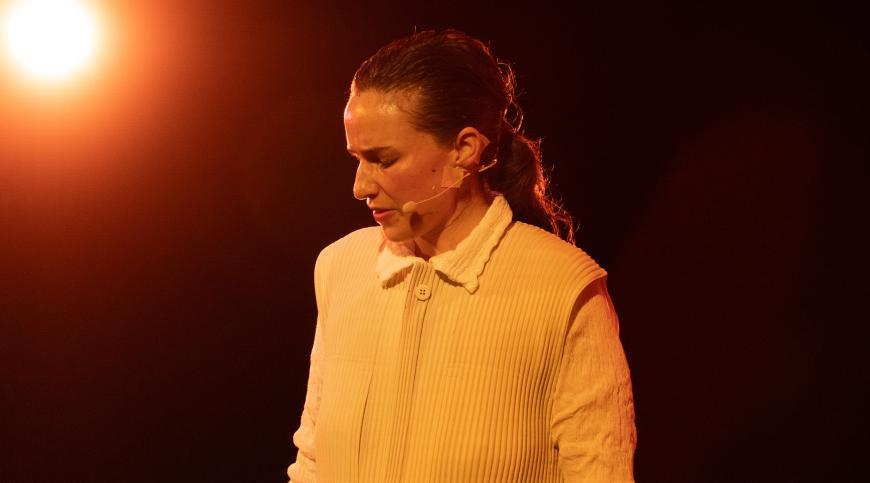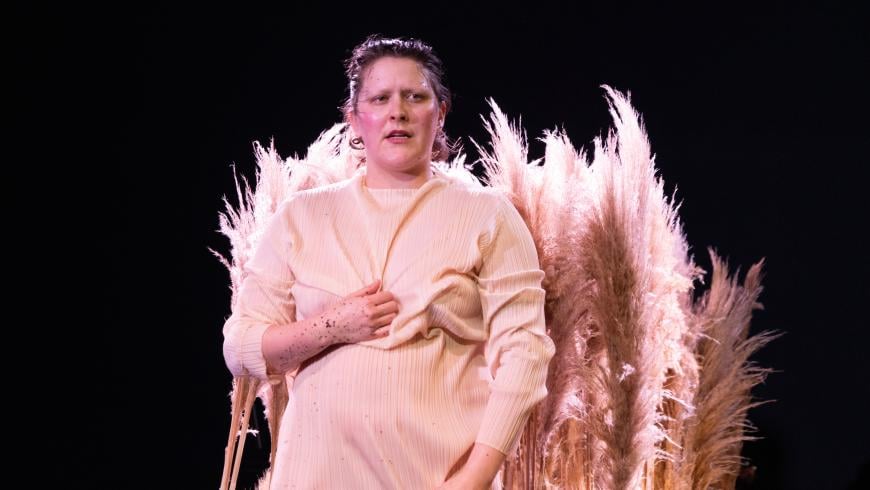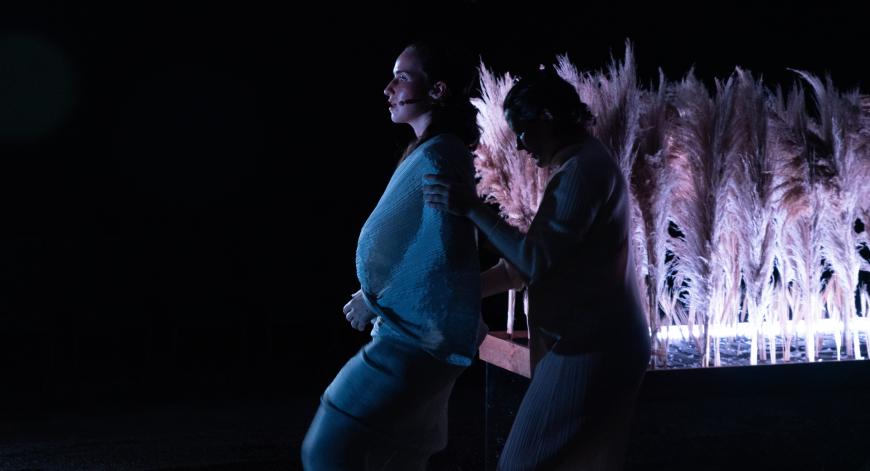
Opera audiences live for moments when the disparate elements of the performance — text, music, movement — coalesce into one undeniable impact. The new opera ISOLA, by composer Alyssa Weinberg and poet J. Mae Barizo, delivered many such synesthetic experiences in its world premiere at the arts space Compound in Long Beach on Saturday.
Here’s just one: Amid a thrumming, muted electronic loop, soprano Ariadne Greif stood naked in a pool of water, arms held out like a tired child, as dancer and choreographer Julia Eichten tenderly dressed her in fresh clothes. The singer’s previous dress limply floated in the pool, where she had violently kicked it off her body. In that vignette, you could recognize all at once that precise, horrible, humbling feeling when, after you’ve thrown off self-preservation in the depths of fear and anger, some part of you returns to heal and protect yourself.
ISOLA grew out of a set of poems Barizo wrote during the 2020 shutdown that investigate time, selfhood, isolation, and healing. Described as a “poetic monodrama,” the show, produced by Long Beach Opera (LBO), had Greif and Eichten wandering the shore of a gravel island replete with tall grasses and a central pool of water, the two acting as extricated elements of some human whole. While ISOLA is concerned with abstract concepts and has no traditional linear story, the production, as superbly directed by George R. Miller and designed by Prairie T. Trivuth, lent immediacy and legibility to the existential drama.

Barizo, as a poet, essayist, and multidisciplinary artist, has created work alongside musicians for much of her career, such as a recent project with the American String Quartet that engaged deeply with the poetics of sounds. Out of that came a book of essays called Pink Noise that stemmed from John Cage’s thought and work.
Barizo’s collaboration with Weinberg began with ISOLA and has expanded into their work-in-progress Drift, for which they received a 2022 Opera America Discovery Grant. ISOLA is Weinberg’s first opera, a medium for which her glowing and openly emotional music is very well suited.
Weinberg’s writing fits Greif like a glove. Saturday saw an incredibly vulnerable, powerful performance from Greif, whipping from glassy-eyed and blissed-out to muttering and paranoid to somber to screaming. Her performance, however, was somewhat sabotaged by unclear sound mixing — everything was too hot, leading to a boominess that obscured the soprano’s enunciation. It was frustrating having to read the text in an intimate space that really had no need for heavy amplification.
The linchpin of this production was the physical theater of Eichten, who is a member of American Modern Opera Company and was a founding member of L.A. Dance Project. Eichten’s role is described as “a dancer body double” on the LBO website, but the relationship between her and Greif read more like an illustration of a mind estranged from its body. Early on, the two peered at each other through the tops of water grasses with light, cautious excitement — it reminded me of seeing neighbors for the first time in weeks during the pandemic. At times, the “body” Eichten represented appeared dormant, sleeping peacefully or collapsed in a corner, while at other times she mirrored the forceful pacing of Greif. But as the work grew, Eichten became a kind of protector, a grounded, caring figure, almost lover-like.

The production stood on the strong base of Miller’s direction, Eichten’s sensitivity, and Greif’s flexibility as singer and actor, bringing the visceral grounding needed to realize the nuances of Barizo’s text and the ever-shifting colors of Weinberg’s setting.
Because ISOLA is essentially a “COVID piece,” the extreme emotions expressed in the poetry feel a little out of place now. Or maybe it’s that I’m still trying to forget and minimize the existential crisis of that time.
But the deep, painful isolation at the center of this work is a human experience, not a pandemic one. Barizo and Weinberg have homed in on a quintessential modern struggle: how to heal the perceived schism between one’s mind and body and address the sometimes insurmountable challenge of being fully present in a specific time and place.
LBO presents two more performances of ISOLA this weekend, Feb. 10 and 11, which are currently sold out but have a waitlist.




